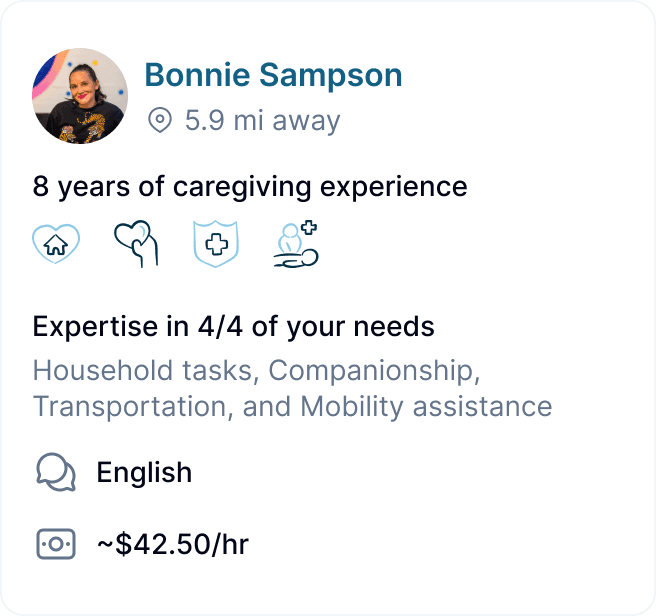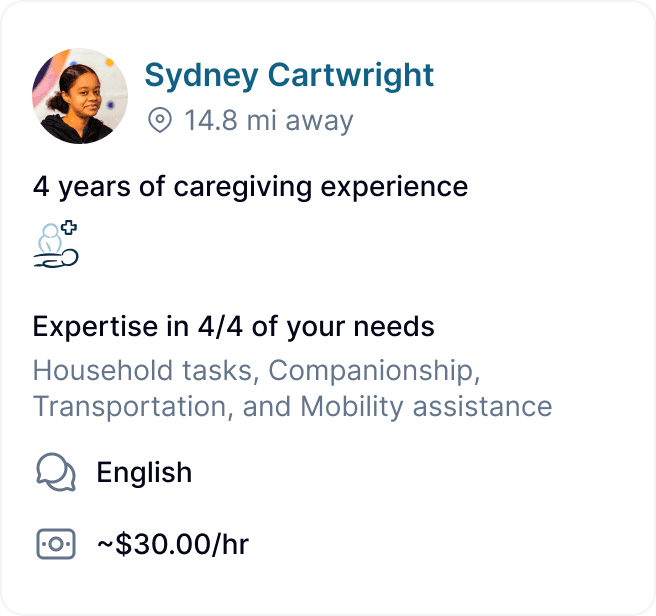Do You Need a Caregiver or a Nurse?



When it comes to ensuring the well-being of a loved one who needs extra support, one of the most common questions families face is: “Do we need a caregiver or a nurse?” The answer depends on the specific needs of the individual.
Both caregivers and nurses play vital roles in healthcare, but their responsibilities, training, and areas of expertise differ significantly. Understanding these differences is essential for making informed decisions about care.
The Core Differences Between Caregivers and Nurses
At the heart of the matter, caregivers and nurses serve distinct functions within the healthcare ecosystem.
Caregivers are professionals who assist individuals with daily activities, offering companionship and practical support. Their main responsibilities include helping with personal care tasks such as bathing, dressing, grooming, and eating. Caregivers also assist with mobility, toileting, and transferring, and may help with light housekeeping, laundry, running errands, and accompanying clients to appointments. Importantly, caregivers do not perform medical duties, but they do provide assistance with all activities of daily living, as well as emotional support and companionship, which is crucial for mental well-being and social engagement. You can read more about "What does a caregiver do?" here.
Nurses are licensed healthcare professionals who provide medical care. They observe, assess, and record patient symptoms, reactions, and progress. Nurses administer medications, monitor vital signs, provide wound care, and collaborate with doctors to implement treatment plans. While nurses could perform all the tasks of a caregiver, their primary focus is on medical needs and health management.
The differences between caregivers and nurses broadly aligns with the differences between home care and home health, which you can read about here.
Training and Qualifications
The level of training and required qualifications is another key distinction.
Caregivers typically receive specialized training in personal care and safety protocols, often requiring around 40 to 45 hours of instruction. While some caregivers may have additional certifications, they do not need formal medical education to begin work. Their expertise lies in supporting daily living and enhancing quality of life for their clients.
Nurses must complete formal education, which can range from a diploma or associate degree for Licensed Practical Nurses (LPNs) to a Bachelor of Science in Nursing (BSN) for Registered Nurses (RNs). Nurses also must pass a licensing exam and are required to participate in ongoing education to maintain their credentials. Their extensive training enables them to perform complex medical tasks and respond to health emergencies.
When to Choose a Caregiver
A caregiver is the right choice when your loved one primarily needs assistance with daily activities and companionship. This is common for seniors who require help with tasks like bathing, meal preparation, or transportation. Caregivers are also ideal for individuals who would benefit from social interaction and emotional support to prevent loneliness and isolation.
For example, if your loved one is recovering from a minor illness or surgery but does not require ongoing medical supervision, a caregiver can help them regain independence while providing comfort and assistance.
When to Choose a Nurse
A nurse is necessary when medical needs are present. This includes situations where your loved one requires medication administration (especially injections or complex medication regimens), wound care, monitoring of vital signs, or management of chronic conditions such as diabetes or heart disease. Nurses are also essential for patients recovering from major surgeries, those with advanced dementia or Alzheimer’s, or anyone needing skilled medical care at home.
For example, if your loved one has a feeding tube, requires regular injections, or is on a ventilator, a nurse is required to ensure these medical needs are met safely and effectively.
How Caregivers and Nurses Work Together
In many cases, the best care plan involves both caregivers and nurses working as a team. Caregivers provide day-to-day support and companionship, while nurses address medical needs and monitor health. This collaborative approach ensures that all aspects of a client’s well-being are covered, from personal care to medical management.
Caregivers often serve as a bridge between clients, families, and healthcare providers. They communicate observations about a client’s condition to nurses and doctors, helping to ensure that any changes in health are promptly addressed. This teamwork is especially important for individuals with complex or evolving health needs.
Cost and Accessibility
Cost is another factor to consider when choosing between a caregiver and a nurse. Generally, caregiver services are more affordable than in-home nursing services, as caregivers do not require the same level of medical training or licensure. This makes caregivers a practical and cost-effective option for families whose loved ones need assistance with daily living but not medical care.
Nurses, due to their specialized skills and licensure, command higher rates. However, their expertise is essential when medical needs are present. In some cases, insurance or long-term care policies may help cover the cost of nursing care, especially for medically necessary services, but this typically only covers short-term care for the duration of the necessary medical service (e.g., evaluating an ostemy opening). In this context, nurses do not provide ongoing non-medical assistance, such as bathing, dressing or meal preparation—these are duties that should be performed by a professional caregiver.
Finding the Right Fit for Your Family
Choosing between a caregiver and a nurse ultimately depends on your loved one’s specific needs. Here are some questions to consider:
Does your loved one need help with daily activities like bathing, dressing, or meal preparation? If yes, a caregiver is likely the best choice.
Does your loved one require medical care such as medication administration, wound care, or vital sign monitoring? If yes, a nurse is necessary.
Is your loved one experiencing loneliness or social isolation? A caregiver can provide valuable companionship and emotional support.
Does your loved one have complex or chronic medical conditions? A nurse is essential for evaluating and managing these needs.
Conclusion
Understanding the difference between a caregiver and a nurse is crucial for making the best care decisions for your loved one. Caregivers provide essential support for daily living and emotional well-being, while nurses address medical needs and ensure health management. In many cases, a combination of both is ideal for comprehensive care.
If you’re ready to find quality, personalized care for your family, consider exploring options like Clara Home Care. Clara connects families with vetted, independent caregivers to make the process of finding and managing in-home support smooth and stress-free and allowing you to focus on what matters most: your loved one’s comfort and quality of life.
When it comes to ensuring the well-being of a loved one who needs extra support, one of the most common questions families face is: “Do we need a caregiver or a nurse?” The answer depends on the specific needs of the individual.
Both caregivers and nurses play vital roles in healthcare, but their responsibilities, training, and areas of expertise differ significantly. Understanding these differences is essential for making informed decisions about care.
The Core Differences Between Caregivers and Nurses
At the heart of the matter, caregivers and nurses serve distinct functions within the healthcare ecosystem.
Caregivers are professionals who assist individuals with daily activities, offering companionship and practical support. Their main responsibilities include helping with personal care tasks such as bathing, dressing, grooming, and eating. Caregivers also assist with mobility, toileting, and transferring, and may help with light housekeeping, laundry, running errands, and accompanying clients to appointments. Importantly, caregivers do not perform medical duties, but they do provide assistance with all activities of daily living, as well as emotional support and companionship, which is crucial for mental well-being and social engagement. You can read more about "What does a caregiver do?" here.
Nurses are licensed healthcare professionals who provide medical care. They observe, assess, and record patient symptoms, reactions, and progress. Nurses administer medications, monitor vital signs, provide wound care, and collaborate with doctors to implement treatment plans. While nurses could perform all the tasks of a caregiver, their primary focus is on medical needs and health management.
The differences between caregivers and nurses broadly aligns with the differences between home care and home health, which you can read about here.
Training and Qualifications
The level of training and required qualifications is another key distinction.
Caregivers typically receive specialized training in personal care and safety protocols, often requiring around 40 to 45 hours of instruction. While some caregivers may have additional certifications, they do not need formal medical education to begin work. Their expertise lies in supporting daily living and enhancing quality of life for their clients.
Nurses must complete formal education, which can range from a diploma or associate degree for Licensed Practical Nurses (LPNs) to a Bachelor of Science in Nursing (BSN) for Registered Nurses (RNs). Nurses also must pass a licensing exam and are required to participate in ongoing education to maintain their credentials. Their extensive training enables them to perform complex medical tasks and respond to health emergencies.
When to Choose a Caregiver
A caregiver is the right choice when your loved one primarily needs assistance with daily activities and companionship. This is common for seniors who require help with tasks like bathing, meal preparation, or transportation. Caregivers are also ideal for individuals who would benefit from social interaction and emotional support to prevent loneliness and isolation.
For example, if your loved one is recovering from a minor illness or surgery but does not require ongoing medical supervision, a caregiver can help them regain independence while providing comfort and assistance.
When to Choose a Nurse
A nurse is necessary when medical needs are present. This includes situations where your loved one requires medication administration (especially injections or complex medication regimens), wound care, monitoring of vital signs, or management of chronic conditions such as diabetes or heart disease. Nurses are also essential for patients recovering from major surgeries, those with advanced dementia or Alzheimer’s, or anyone needing skilled medical care at home.
For example, if your loved one has a feeding tube, requires regular injections, or is on a ventilator, a nurse is required to ensure these medical needs are met safely and effectively.
How Caregivers and Nurses Work Together
In many cases, the best care plan involves both caregivers and nurses working as a team. Caregivers provide day-to-day support and companionship, while nurses address medical needs and monitor health. This collaborative approach ensures that all aspects of a client’s well-being are covered, from personal care to medical management.
Caregivers often serve as a bridge between clients, families, and healthcare providers. They communicate observations about a client’s condition to nurses and doctors, helping to ensure that any changes in health are promptly addressed. This teamwork is especially important for individuals with complex or evolving health needs.
Cost and Accessibility
Cost is another factor to consider when choosing between a caregiver and a nurse. Generally, caregiver services are more affordable than in-home nursing services, as caregivers do not require the same level of medical training or licensure. This makes caregivers a practical and cost-effective option for families whose loved ones need assistance with daily living but not medical care.
Nurses, due to their specialized skills and licensure, command higher rates. However, their expertise is essential when medical needs are present. In some cases, insurance or long-term care policies may help cover the cost of nursing care, especially for medically necessary services, but this typically only covers short-term care for the duration of the necessary medical service (e.g., evaluating an ostemy opening). In this context, nurses do not provide ongoing non-medical assistance, such as bathing, dressing or meal preparation—these are duties that should be performed by a professional caregiver.
Finding the Right Fit for Your Family
Choosing between a caregiver and a nurse ultimately depends on your loved one’s specific needs. Here are some questions to consider:
Does your loved one need help with daily activities like bathing, dressing, or meal preparation? If yes, a caregiver is likely the best choice.
Does your loved one require medical care such as medication administration, wound care, or vital sign monitoring? If yes, a nurse is necessary.
Is your loved one experiencing loneliness or social isolation? A caregiver can provide valuable companionship and emotional support.
Does your loved one have complex or chronic medical conditions? A nurse is essential for evaluating and managing these needs.
Conclusion
Understanding the difference between a caregiver and a nurse is crucial for making the best care decisions for your loved one. Caregivers provide essential support for daily living and emotional well-being, while nurses address medical needs and ensure health management. In many cases, a combination of both is ideal for comprehensive care.
If you’re ready to find quality, personalized care for your family, consider exploring options like Clara Home Care. Clara connects families with vetted, independent caregivers to make the process of finding and managing in-home support smooth and stress-free and allowing you to focus on what matters most: your loved one’s comfort and quality of life.
When it comes to ensuring the well-being of a loved one who needs extra support, one of the most common questions families face is: “Do we need a caregiver or a nurse?” The answer depends on the specific needs of the individual.
Both caregivers and nurses play vital roles in healthcare, but their responsibilities, training, and areas of expertise differ significantly. Understanding these differences is essential for making informed decisions about care.
The Core Differences Between Caregivers and Nurses
At the heart of the matter, caregivers and nurses serve distinct functions within the healthcare ecosystem.
Caregivers are professionals who assist individuals with daily activities, offering companionship and practical support. Their main responsibilities include helping with personal care tasks such as bathing, dressing, grooming, and eating. Caregivers also assist with mobility, toileting, and transferring, and may help with light housekeeping, laundry, running errands, and accompanying clients to appointments. Importantly, caregivers do not perform medical duties, but they do provide assistance with all activities of daily living, as well as emotional support and companionship, which is crucial for mental well-being and social engagement. You can read more about "What does a caregiver do?" here.
Nurses are licensed healthcare professionals who provide medical care. They observe, assess, and record patient symptoms, reactions, and progress. Nurses administer medications, monitor vital signs, provide wound care, and collaborate with doctors to implement treatment plans. While nurses could perform all the tasks of a caregiver, their primary focus is on medical needs and health management.
The differences between caregivers and nurses broadly aligns with the differences between home care and home health, which you can read about here.
Training and Qualifications
The level of training and required qualifications is another key distinction.
Caregivers typically receive specialized training in personal care and safety protocols, often requiring around 40 to 45 hours of instruction. While some caregivers may have additional certifications, they do not need formal medical education to begin work. Their expertise lies in supporting daily living and enhancing quality of life for their clients.
Nurses must complete formal education, which can range from a diploma or associate degree for Licensed Practical Nurses (LPNs) to a Bachelor of Science in Nursing (BSN) for Registered Nurses (RNs). Nurses also must pass a licensing exam and are required to participate in ongoing education to maintain their credentials. Their extensive training enables them to perform complex medical tasks and respond to health emergencies.
When to Choose a Caregiver
A caregiver is the right choice when your loved one primarily needs assistance with daily activities and companionship. This is common for seniors who require help with tasks like bathing, meal preparation, or transportation. Caregivers are also ideal for individuals who would benefit from social interaction and emotional support to prevent loneliness and isolation.
For example, if your loved one is recovering from a minor illness or surgery but does not require ongoing medical supervision, a caregiver can help them regain independence while providing comfort and assistance.
When to Choose a Nurse
A nurse is necessary when medical needs are present. This includes situations where your loved one requires medication administration (especially injections or complex medication regimens), wound care, monitoring of vital signs, or management of chronic conditions such as diabetes or heart disease. Nurses are also essential for patients recovering from major surgeries, those with advanced dementia or Alzheimer’s, or anyone needing skilled medical care at home.
For example, if your loved one has a feeding tube, requires regular injections, or is on a ventilator, a nurse is required to ensure these medical needs are met safely and effectively.
How Caregivers and Nurses Work Together
In many cases, the best care plan involves both caregivers and nurses working as a team. Caregivers provide day-to-day support and companionship, while nurses address medical needs and monitor health. This collaborative approach ensures that all aspects of a client’s well-being are covered, from personal care to medical management.
Caregivers often serve as a bridge between clients, families, and healthcare providers. They communicate observations about a client’s condition to nurses and doctors, helping to ensure that any changes in health are promptly addressed. This teamwork is especially important for individuals with complex or evolving health needs.
Cost and Accessibility
Cost is another factor to consider when choosing between a caregiver and a nurse. Generally, caregiver services are more affordable than in-home nursing services, as caregivers do not require the same level of medical training or licensure. This makes caregivers a practical and cost-effective option for families whose loved ones need assistance with daily living but not medical care.
Nurses, due to their specialized skills and licensure, command higher rates. However, their expertise is essential when medical needs are present. In some cases, insurance or long-term care policies may help cover the cost of nursing care, especially for medically necessary services, but this typically only covers short-term care for the duration of the necessary medical service (e.g., evaluating an ostemy opening). In this context, nurses do not provide ongoing non-medical assistance, such as bathing, dressing or meal preparation—these are duties that should be performed by a professional caregiver.
Finding the Right Fit for Your Family
Choosing between a caregiver and a nurse ultimately depends on your loved one’s specific needs. Here are some questions to consider:
Does your loved one need help with daily activities like bathing, dressing, or meal preparation? If yes, a caregiver is likely the best choice.
Does your loved one require medical care such as medication administration, wound care, or vital sign monitoring? If yes, a nurse is necessary.
Is your loved one experiencing loneliness or social isolation? A caregiver can provide valuable companionship and emotional support.
Does your loved one have complex or chronic medical conditions? A nurse is essential for evaluating and managing these needs.
Conclusion
Understanding the difference between a caregiver and a nurse is crucial for making the best care decisions for your loved one. Caregivers provide essential support for daily living and emotional well-being, while nurses address medical needs and ensure health management. In many cases, a combination of both is ideal for comprehensive care.
If you’re ready to find quality, personalized care for your family, consider exploring options like Clara Home Care. Clara connects families with vetted, independent caregivers to make the process of finding and managing in-home support smooth and stress-free and allowing you to focus on what matters most: your loved one’s comfort and quality of life.
More about caregiving
More about caregiving


Self-Determination in Senior Care: What It Means and Why It Matters



Lowrie Hilladakis


How Much Does Aging In Place Cost?



Clara Editorial Team


What Is Personalized Home Care? Why It Matters for Your Aging Parent



Lowrie Hilladakis


What to Do If Your Parent Refuses Help



Clara Editorial Team


What If I Only Need Home Care for a Few Hours a Week?



Clara Editorial Team


What Is A Companion Caregiver?



Vanessa Bustos


A Beginner's Guide To Senior Care Terminology



Jon Levinson


What Is The Difference Between Home Care And Home Health?



Lowrie Hilladakis


How a Caregiver Supports Post-Hospital Care



Jon Levinson


What is a Senior Care Plan?



Jon Levinson
GEt started for free
Better care starts with Clara.
Find, hire, and pay top-notch caregivers without the headache for a price that fits your budget.



GEt started for free
Better care starts with Clara.
Find, hire, and pay top-notch caregivers without the headache for a price that fits your budget.



GEt started for free
Better care starts with Clara.
Find, hire, and pay top-notch caregivers without the headache for a price that fits your budget.

